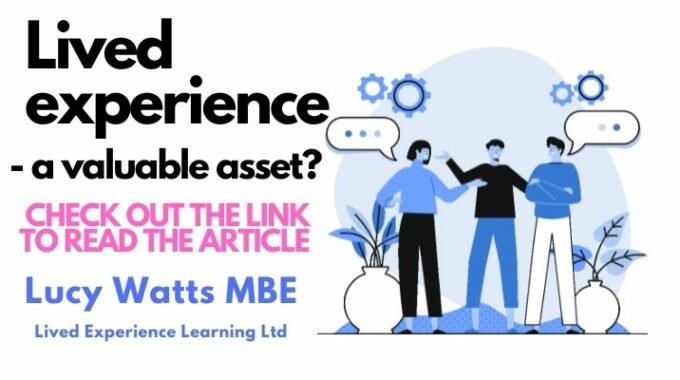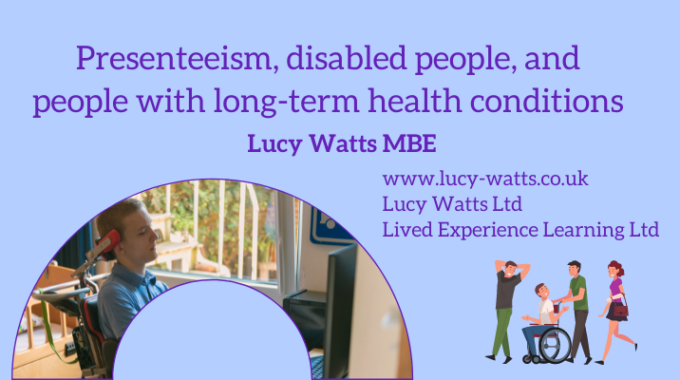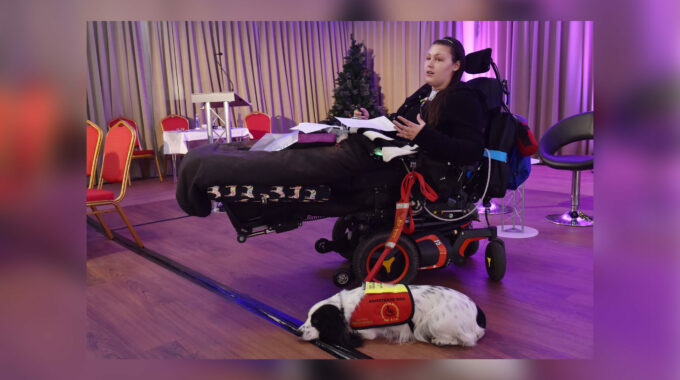What if we viewed lived experience as an asset? As an asset of professional, economic,…
SEND, Transition and Outcomes for Young People
The transition period is a difficult time. Young people have enough going on in their lives, so to be poorly and/or disabled just adds another dimension. Then when you factor in the change from children’s to adult’s services, it’s a huge ordeal for them. Whether they’ve been disabled/poorly from birth, or conditions have presented themselves later on in childhood or into the teenage years, a good transition and all agencies (and different departments within these agencies) working together are vital. The individual needs to be at the centre of this, their views, needs, goals and dreams forming the basis of their care. The Special Educational Needs and Disabilitites (SEND) reforms and the introduction of (Educational Health and Care) EHC plans aim to improve multi-agency communication and improve the experience for young people – including during the transition period.
I became unwell in January 2008 aged fourteen. I had been receiving physiotherapy at my local hospital for over a year and had been cared for by a range of different services including gastroenterology, orthopaedics, burns and plastic surgery. However all my problems deteriorated rapidly (after a slow decline from the age of ten) and suddenly we were thrown into the world of hospital admissions, scans, tests, wheelchairs, disabilities and social services. I started using a wheelchair but couldn’t cope with going anywhere due to the pain of bumps and uneven ground. So leaving the house became so difficult and problematic I was virtually housebound. My education was non-existant as my school neglected to send work home or me or fill out the paperwork necessary for me to receive home tuition through the Children’s Support Services despite my desperation to continue my education. I loved my schoolwork and couldn’t understand why barriers were being used to stop me learning. If I had been expelled I would have received tutoring, but because I was sick it took three months of fighting to get any home tuition. When the Children’s Support Services took over, I thrived on working towards my future.
After going from person to person and having test after test we were given the name of a specialist who would go on to diagnose me with Ehlers-Danlos Syndrome in October 2008, just days after my fifteenth birthday. I’d had months of people telling me I was fat and lazy, that I had a school phobia and was attention seeking, so to have a name for my condition and an understanding Professor who listened to me was a breath of fresh air. Unfortunately a consultant from the team led by this Professor called a meeting of the agencies supporting me and suggested that I shouldn’t do my GCSE’s, I should just focus on my rehabilitation as all I had was chronic pain and mum was allowing my illness behaviour. Despite working together with the Professor, he claimed Ehlers-Danlos didn’t exist. He suggested forcing me to sit up saying I was lazy when actually I had Postural Orthostatic Tachycardia Syndrome, which was subsequently diagnosed in 2010. He also claimed my gut problems were in my head and I didn’t need a feeding tube; fortunately I was later referred to the world expert on gut problems caused by EDS who diagnosed me with severe gut dysmotility/Chronic Intestinal Pseudo Obstruction. However I fought hard and completed my GCSEs in 2010 achieving an A* in Sociology, A’s in English, Biology and Physics, B’s in Maths and Chemistry, a C in French and two distinctions in IT.
I was deteriorating rapidly over the course of 2009, I now couldn’t eat and was bed bound. In September 2010 I started going to college for an hour per day – sitting me up for as long as I could cope, and I proved all the doubters wrong. Unfortunately I only managed a term and a half in college before I became too poorly. I was very ill, the hospice were involved and my doctors were running out of options – we had tried almost everything. I had previously been started on enteral feeds via an NG tube in August 2009, having my PEG fitted in October 2009. My gut was failing miserably and I was not absorbing these feeds. As a last resort I was started on TPN – intravenous nutrition – in May 2011, and had an Ileostomy formed in February 2012.
All along the way we faced problems and barriers, and fell into many loopholes. We had to fight for everything. My grandparents stepped in and paid for a stairlift in our old house because the waiting list was 18 months and I had no choice but to sleep in our open plan living space when I could no longer walk. We borrowed funds to purchase a rise and recline chair. We were provided with a grab rail through the Occupational Therapy Department in our toilet, but were only entitled to one. I couldn’t pull myself up with one, so had to have the other one fitted privately. We had to fundraise for an electric wheelchair that reclined in 2011 because an assessment couldn’t be made for an electric wheelchair until we had ramps in the property. However, the funding through Social Services had all been allocated for that year and we would need to wait until the following year (another 12+ months) to see if a grant would be made to provide ramp access to our bungalow. We regularly paid for private care at times to get what I needed. We had to fight for my education, fight for my treatment, fight for a pressure mattress and profiling bed, fight for my Social Services budget; a fight for so many things when the struggle to cope with me being ill was difficult for us as a family.
So much of our problems would have been avoided if agencies communicated and worked together. Part of my educational problem was that the school didn’t see the point in statementing me. Had I been given an EHC plan, things would have been so much easier and drawing together all of my care would have stopped us having to play piggy in the middle. If only people had communicated, worked together and kept my wants and needs at the centre of my care, things would have been so much easier.
When I reached 19 my treatment from the consultant who inferred that “EDS doesn’t exist” came to an end as he worked in the adolescent unit. By this stage my health had deteriorated so much I almost had an apology from him – he said he felt the medical profession had failed me! Under the medical team I now had around me, my care rapidly improved. My transition was not the best. It was hard and frightening going from being on a children’s ward with my mum there all the time making decisions for me (and a paediatrician who would not talk to me or take into account what I had to say) to being on an adult ward with five dementia patients, mum only allowed in for visiting time and suddenly I was having to make my decisions by myself for the first time in my life, and life-changing decisions at that; it could have been better. I went through a host of big changes around that time (between the ages of sixteen and eighteen), getting a whole new team of doctors – adult doctors, transitioning over to adults services, starting college, fundraising for the electric wheelchair, my health deteriorating rapidly, multiple hospital stays, my weight dropping to under seven stones and being started on TPN, being forced to give up college due to my health and then having my Ileostomy formed….it was a hectic time.
Suddenly my care came together, education, the NHS and Social Services all working together to achieve the lifestyle that I wanted and aiming for the goals I had set myself. Yes I was still bed bound for the majority of the time, yes I was still deteriorating – and quite rapidly at that – and yes I had to give up college but life was on the up. This is the aim of the SEND reforms and EHC plans – bringing all the services together to work as part of a team and having the needs, goals and wishes of the children and young people at the centre of their care.
Look at my life now: it’s not perfect, I’m very poorly and deteriorating and not in education at all but I am making a difference by writing and speaking and giving back to the services that have supported me. Things I have said and done are making an impact on the world (well, the UK). My doctors of various specialities, hospice nurses and carers, district nurses, continuing health professionals, personal health budget, wheelchair services, the voluntary/charitable sector and all others involved in my life are working together, all with my quality of life, goals and wishes as their focus. It’s taken seven long years of being poorly to reach this point, and my aim is to make it right for everyone, but I am achieving the things I want to and am supported well in doing this. My experience over the last two years is how everyone’s care should be. Working together and having the individuals needs, wants and desires at the centre is how the best outcomes will be achieved. It’s not just about education, health and care, it’s about quality of life, achieving your goals and being supported to live the life you want to live.
 |
| Before I was ill |
 |
| Now |




very well written and your comment about the impact in the UK-well u have impacted so many many people all over the world. I am so happy everyone got together and wow, isn't it amazing what communicating does? keep rockin it Lucy.
Well done Lucy- I also have EDS as do all my children. They have been ignored, not allowed acces to experts schooling and quality of life has suffered. I have printed your page to send in with my sons EHC application as no one seems to believe the effects of this condition a my children, like you ( unless you are in your wheelchair of course) look normal. Its heartbreaking to be treated so badly by those who refuse to educate themelves. Good luck Lucy and thank you for the example of what can happen if proper support is given. xxx
Praying for you Lucy. I came across your blog when Martin and Amy posted you to Sammy The Cocker Spaniels Facebook page. You are an inspiration to me. I know your battle isn't easy, but you need to keep fighting. You will do great things. You already have done more than you can possibly know. You are Lucy the Great! This world is Forever Grateful you blessed us with your sole. Keep on, keeping on. You are strong. You are blessed. I look up to you and everything you embody. I hate the fact that you are faced with these unfortunate circumstances, it's not fair. It breaks my heart and I don't even know you. But you've inspired me. And you are my inspiration to inspire others. I hope I get the opportunity to meet you one day. You are an angel on earth. Stay please. The world needs more people like you!